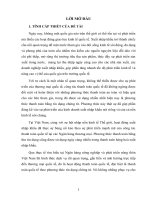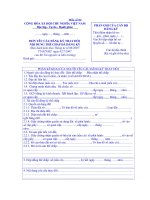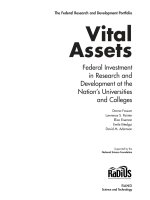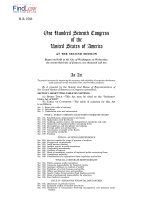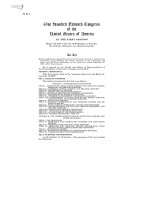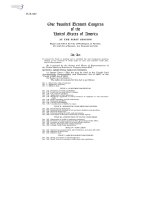Diversity and inclusion at the workplace Đa dạng và hòa nhập tại nơi làm việc
Bạn đang xem bản rút gọn của tài liệu. Xem và tải ngay bản đầy đủ của tài liệu tại đây (434.54 KB, 15 trang )
Đa dạng và hòa nhập tại nơi làm việc
Objectives of this Training
• To provide a clear understanding of what
diversity, inclusion, and culture.
• To raise a greater awareness and sensitivity
to diversity issues that go well beyond the
assumed categories.
• To recommend behavioral tools for fostering
a more cohesive workplace.
Diversity Defined
Diversity is the mosaic of people
who bring a variety of backgrounds,
styles, perspectives, values and
beliefs as assets to the groups and
organizations with which they
interact.
Distinction Between EEO, Affirmative Action and
Diversity & Inclusion
Equal Employment
Opportunity
Affirmative Action
Diversity & Inclusion
The enforcement of statutes to
The effort to achieve parity in the
Leveraging differences in the
prevent employment
workforce through outreach and
workforce to achieve better
discrimination
eliminating barriers in hiring
results
Primary and Secondary
Dimensions of Diversity
Geographic
Military
Location
Experience
Education
Work
Gender
Age
Experience
Work/thinking
Style
Sexual
Disability
Socioeconomic
Orientation
status
Family
Ethnic
Status
Race
Religion
Heritage
First
Communication
Language
Style
Organizational
Role and Level
All Communication is Filtered
Through Your Cultural Perspective
•
•
•
•
•
•
•
•
•
•
•
Age
National origin
Race
Sexual orientation
Religion
Disability
Gender
Education
Work role/experience
Personality
Customs
•
•
•
•
•
•
•
•
•
•
•
Geographic location
Functional discipline
Languages used
Values
Communication style
Work Style
Learning style
Economic status
Family situation
Military experience
Philosophical perspective
A New Metaphor for American Culture
•
The “melting pot” theory of American society has evolved,
instead consider a vegetable soup metaphor.
•
You can easily identify and taste
the unique flavors of the
individual parts.
•
Members of various cultural groups
may not want to be assimilated, they
want their tastes, looks and texture
to remain whole.
•
To reap the business benefits of diversity, you must employ
inclusive work strategies.
USD 259’s Diversity & Inclusion Goals:
Making Full Use of the Unique Skill Sets of Each Employee
Food for Thought:
Do I bring my “full self” to work?
My ideas
My personality
My opinions
My uniqueness
My background
Benefits of Workforce Diversity & Inclusion
•
•
•
•
•
•
•
•
•
•
Improved understanding of those you work for, with, and around.
Creates a work environment that allows everyone to reach their full potential.
Provides multiple perspectives on problem solving.
Better performance outcomes.
Increases employee productivity.
Increased retention rates.
Boosts employee morale.
Improved customer relations.
Reduces complaints and grievances.
It’s the right thing to do!
Business and Economic Imperatives
• Workforce, racial, and gender diversity are positively associated with:
•
higher performance outcome measures
• more effective group processes
• higher productivity
Business and Economic Imperatives
• Discrimination and poor diversity management pose an economic cost:
• The average EEO complaint costs the organization approximately
$250,000
• 25 - 40% of workforce attrition rate and 5-20% in lost productivity, can
be attributed to poor diversity management
• Turnover costs 75 - 150% of the replaced employee’s salary.
The Effects of Diversity on Business Performance: Report of the Diversity Research Network, November 2002: Five year longitudinal study on workforce diversity and performance measures in Fortune 500 companies.
*Work Team Dynamics and Productivity in the Context of Diversity Conference, Center for Creative Leadership, N.Y.U, A.P.A, ,October, 1994
Organizational Inclusion
Extent to which the organization provides fair and equitable
Equity of Practices
treatment to all employees and groups
Extent to which culture avoids assimilationist strategies and is
open to learning from different and non-traditional sources
Organizational Culture
Extent to which the organization draws upon diverse sources of
Voice & Participation
knowledge and experience for planning and operations
18
Organizational Culture
Key Questions
1.Do USD 259 adult stakeholders, check their individual identities at the door?”
2.Does the “way we’ve always done it” impede thinking? How?
3.Is there some way you “ought to be” in order to fit into your workplace environment?
19
Every Student Future Ready
Take-A-Ways
What does this mean for the USD 259 workforce?
• Workforce diversity enhances performance and productivity.
• To be effective, diversity management must be strategically implemented and aligned with business goals.
• Diversity requires investment and attention in order to be effective.
• Intolerance and insensitivity to diversity breeds disastrous and costly results; agencies must empower
employees and guarantee their EEO rights.
• Diversity principles must be incorporated in all aspects of an organization’s performance culture, including:
- Leadership communications
- Group work processes
- Recruitment and retention strategies
- Succession planning
- Rewards and developmental systems
- Strategic planning
Keith Reynolds
Director of Trainingin Equity and Diversity
AMAC rm.401
Tel.973-4572
Fax 973-4692
Thank You!
